MEMOIRS | GLORIFICATION OF COLLABORATORS | HUMAN RIGHTS | PERSON OF THE YEAR | LITHUANIA | LITVAK AFFAIRS
by Evaldas Balčiūnas
◊
Evaldas Balčiūnas is Defending History’s Person of the Year 2023
As far as I knew at first, there “were no Jews” in the village in the 1960s. However, young people behaving in dubious ways were for some reason called “mishugin.” I did not understand the meaning of that word. It sounded like a strange semi-Slavic name to me. I only learned as an adult that it derives from a Yiddish word (meshúge, mesúgener) for someone being called crazy or senseless. But I later learned that some of the neighbors with whom I would chase a football were Jews. After the Six Day War, yet another wave of antisemitism arose and Jews isolated themselves and started preparing for emigration to Israel. I also remember the library. At the time, I used to read a lot but would not understand much of it. Another adventure was going to the Russian-speaking Pioneer camp where I rapidly learned Russian. I was eight years old. Even more mysterious books became available to me. And my fascination with the Russian language, and Russian literature, continues to this day, despite the current wave against anything Russian, from any period or quarter.
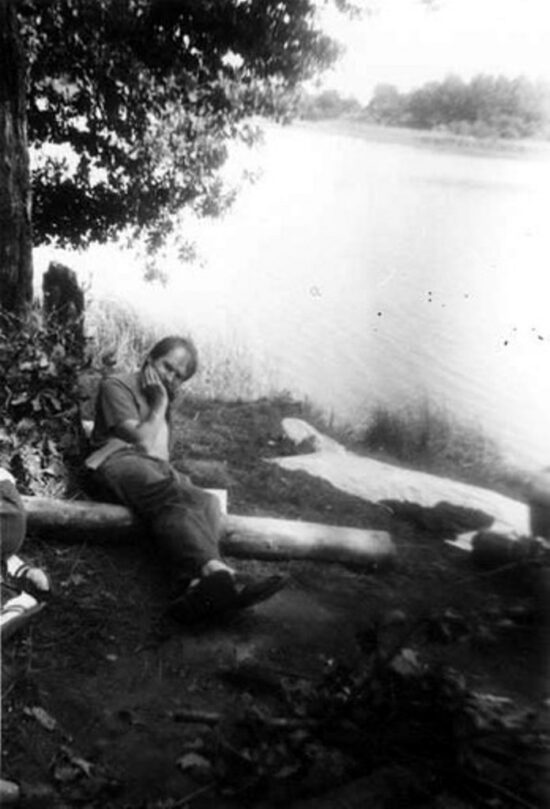
I moved back to Šiauliai. I was ten. My hobbies were simple. I liked math, chess, boxing, and postage stamps. All the young philatelists of Šiauliai would usually get rare post stamps from my neighbor a few doors down the street, they would simply call him “the Jew.” Nobody used his real name. Only in my adulthood did I ask the local Jewish community about him and found out that his name was Kálmen. He lived a long life, survived the Nazi terror, saw the Soviet Union collapse, and left his extensive collection of stamps to the Šiauliai Jewish community.
While at school, I saw a couple of bus driver strikes. One summer, I also “took part” in one short strike: the laborers’ crew that I had been sent to went on strike for one whole hour. The lightning-fast victory of the strike left me, a fifteen-year-old, an indelible impression. After school, I tried to study physics at Vilnius University, but a student’s life, wine, passionate love for an emancipated girl, and the newly discovered science of philosophy — which did not correlate with the Soviet reality or its limitations — brought me back home.
I worked in a factory and read a lot. Sometimes, after work, in the evenings, I would roam around Šiauliai. I had a guide, a Jewish guy who was a little older than me. He showed me the other face of Šiauliai, which I find dear to this day. Not everything was pretty in Šiauliai at the time. In the last year of school, in a shop close to my home, an actually attempted anti-Jewish pogrom in miniature took place. An angry mob wanted to beat to death a Jewish woman who sold ice cream. The reason (some people don’t believe me to this day) was a mix of the medieval blood libel exacerbated by an antisemitic Soviet story about Jewish poisoners. Absurd reasoning inexorably leads to absurd action. A mob of several hundred excited, raging people, most of them men (it happened right next to a beer bar), wanted to beat up the poor ice cream selling lady.
Then, the Soviet Army showed me another, non-Lithuanian face of “Soviet socialism.” I was in the Stroibat, the construction workers’ battalion. The unit was infested with violence and nationalistic and interethnic conflicts, during which tens or even hundreds of young men would fight each other. In the army, I was thankful for my quick reflexes, boxing lessons, and the ability to find common ground with people of diverse ethnicities. I had friends in all ethnic groups, which gave me the lifelong wisdom never to join an angry mob. I was not a good soldier. Also, I spoke about the Soviet regime in a way that the authorities did not approve of. In the army, I learned about the KGB and its methods.
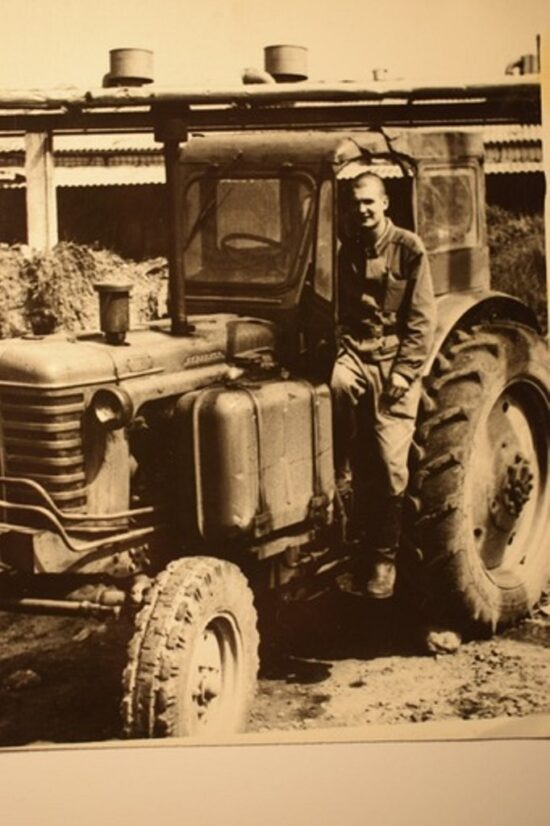
Before my time in the army was over, I was called to the Kharkov KGB headquarters and given an official warning that my interpretations of Soviet reality were officially known as “blackening” (libelous), and may be punished by up to five years in prison. But within the army, I learned that my views are usually simply called “anarchism.” This encouraged me to become interested precisely in the older and newer classics of this current of political thought. From the army, I brought home tuberculosis, which had to be intermittently taken care of for several years. I came back to work in the same bicycle factory as before. The pay was good, I could go on trips during the weekends, I continued to read a lot. Sometimes, we would raise demands at work for better pay and working conditions. Gorbachev’s Perestroika provided, for the first time, many opportunities for that.
Later, I joined various union organizations and became a member of the rather quaintly named Anarchosyndicalist Federation. I would also sometimes write articles on social issues for the press. After the Soviet Union collapsed, I tried to work in the trade unions, but, by 1994, I had been pushed out. I was unemployed, my only livelihood was honoraria from various newspapers for the articles I wrote. I travelled around Europe a little, went to Poland, Germany, France, Switzerland, Slovakia, Hungary, and Romania. I even made it to Paris.
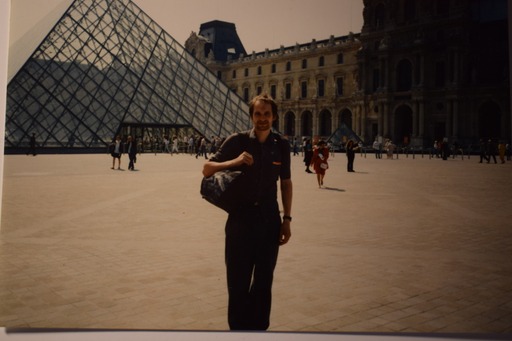
But my life was falling apart, it was difficult to adapt. Dreams of social revolution had to be pushed aside, I had to earn money for food, clothes, and other necessities. After a while, when my livelihood was in order with journalism, I joined the group of friends that created and maintained the anarchija.lt website. Over several years, I wrote several hundred articles for the portal on the issues of anarchism, social struggles, and trade union history. I also joined the Free University LUNI, and was invited to give lectures as part of its program.
◊
One of our website’s points of intersection was the “historical memory politics” carried out forcefully, and with huge investment, by state organs of the Republic of Lithuania. In my view, the far right (and believe you me, those who glorify Holocaust collaborators as heroes are far right, whatever their facade) is pushing its agenda on society. The country chose “anti-Soviet partisans” who were murderers and, quite often, simple perpetrators of the Holocaust, as its heroes, often to be glorified with public-space, state-financed street names, plaques, statues, school names and publications. It seemed to me then, and it seems to me now, that to publicly disagree with this policy is a simple exercise of free speech in our post-Soviet world.
At the same time, overt neo-Nazis, supported by right-wing politicians masquerading as “mainstream” were strengthening their positions in society, what with the wherewithal of seemingly limitless state budgets. They started organizing regular street marches at first in Vilnius, later also in Kaunas. But there was also in our air some desire to resist them, which led to the establishment of the “Antifa Lietuva” website. At the time, I wrote about the heroized perpetrators of the Holocaust a lot. Others wrote about neo-Nazis in the Lithuanian armed forces. Our activities attracted the attention of the State Security Department of Lithuania. In 2011, we were included in its annual report on the threats to the security of Lithuania. Consequently, we were targeted by an array of actions and campaigns of provocation.
The courts were much stricter on the issue of anti-fascists’ alleged misdemeanors than on the neo-Nazis’ actual attacks on their enemies. In 2012, a group of neo-Nazis beat up several people near Cathedral Square in our capital city, Vilnius. This was reported on national TV, and we wrote about it on our portal, too. This was the cause for criminal proceedings against our portal. I was the legally registered initiator of the website. Therefore, I was tried at the Vilnius District Court. Four different judges were involved in the trial. It lasted years, I had to travel hundreds of kilometers to each court session, and it meant a lot that a small team from DefendingHistory.com (only) was always on hand to offer moral support. Finally, it was demonstrated that the plaintiffs had falsified the evidence, and, in late 2014, I was found Not Guilty. But due to constant police persecution, we had to close the portal. Incidentally, two out of three neo-nazis who had sued us were later found guilty in the case of composer Tomas Dobravolskis’s murder. However, the main plaintiff of my case was given a suspended sentence, although it was proven that he had used violence against people he disagreed with, and he continued to work as an assistant attorney with full legal accreditation and wide social acceptance in polite society.
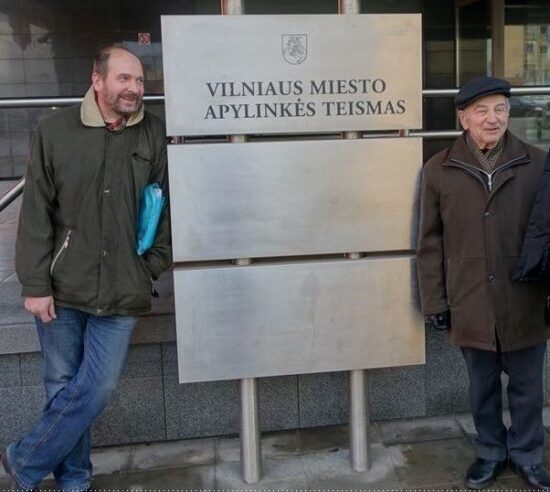
With Milan Chersonski from the Defending History support team at one of many hearings at Vilnius District Court
At the time, besides my journalistic activity, I translated a couple of books into Lithuanian: Nestor Machno’s “Russian Revolution in Ukraine” and Lev Tolstoy’s “The Forbidden.” Both were published by “Kitos Knygos” (‘Other Books’) publishing house. For over a decade now, I have been writing for “Defending History” on the issues of state-sponsored Nazi glorification, the Holocaust, etc. Lithuanian news portals do not want to publish me, because the State Security Department and the Ministry of National Defense’s Strategic Communication Department spread negative information on my person (and once that happens in Lithuania, your career in the mainstream is abruptly ended). Dr. Andrius Kulikauskas has written about it for “Defending History,” and I demanded that the Ministry of National Defense stop informational warfare against my person when I was named as a target of informational warfare on their official state website.
After exposure in DefendingHistory.com (in English), their public attacks ceased. LRT.lt, Delfi.lt, and other portals of the sort stopped spreading negative information on my person. I have no time, resources, or desire to try and disprove their libel; on the other hand, some of their made-up stories are actually quite funny. Together with Andrius Kulikauskas, we carried out a research on Jonas Noreika’s criminal activities. The research, in cooperation with Grant Arthur Gochin, pursuing his court case against the Genocide and Resistance Research Center of Lithuania, had some social resonance. However, even after the publication of Noreika’s granddaughter’s Silvia Foti’s historic book in the United States, “The Nazi’s Granddaughter,” Lithuanian institutions have not taken appropriate measures. The public space street names, statues, plaques and all the rest are still in place. In fact, after the central Vilnius Noreika plaque on the facade of the National Library of Sciences was taken down, a bigger and better one, adorned with bas relief sculpture, were erected, and continue to mar Vilnius’s standing in the world every single day.
The same story repeats itself with other Nazi collaborators: the Republic of Lithuania still does not have enough courage to remove symbols of their commemoration, even while the community of professionally employed historians mostly agrees that they had participated in massacres. But far-right historians who support this glorification mostly rally around the Genocide and Resistance Research Center and its journal “Genocide and Resistance.” Historians of other opinions have no separate journal of their own. The list of my articles on “Defending History” can be found here. Sometimes, I have to come back to the issues mentioned in these articles by submitting some documents to the institutions, taking part in a commemoration event, or communicating with other people who research these issues.
As long as Lithuania continues to glorify Holocaust and Nazi criminals, such issues cannot be left in peace.
During this past decade of journalistic activity, my work acquired a modest readership and I am sometimes invited to publicly present various topics. I recently presented an account on how Šiauliai Jews were massacred to the Šiauliai Jewish Community (a study of which I am very proud), as well as on history of the blood libel and pogroms. To the Šiauliai Esperanto speakers (yes, another beloved interest of mine), I spoke about Lithuanian Tolstoyans, who actively took part in rescuing Jews during the war. This summer, I told a group of German youth from “Antifa 4630” (named after Bochum’s postcode) about clashes between neo-Nazism and antifascism. Lectures bring me the joy of communication, but they demand a lot of energy from me, since the topics are not always well researched and I have to research them myself. Moreover, this year’s wave of desecration of Holocaust memorials (I can now count at least ten such cases) saddens me. Vandalism is flourishing after the government’s decisions to destroy not only “general” Soviet-era monuments, but also those specifically marking the defeat of the Nazis (sites cherished until the last breaths of Holocaust survivors and proud veterans of the war against Hitler hailing from all our local nationalities). Meanwhile, not one public memorial glorifying Holocaust collaborators may be touched. During Kaunas’s year as a “Capital of European Culture” not a single shrine to Holocaust collaborators and perpetrators was removed. It is time for a truthful reckoning with a challenging history, and for those calling for such reckoning to no longer be victims of state vilification. Democracy, after all, must include by definition the right of dissidents to dissent.
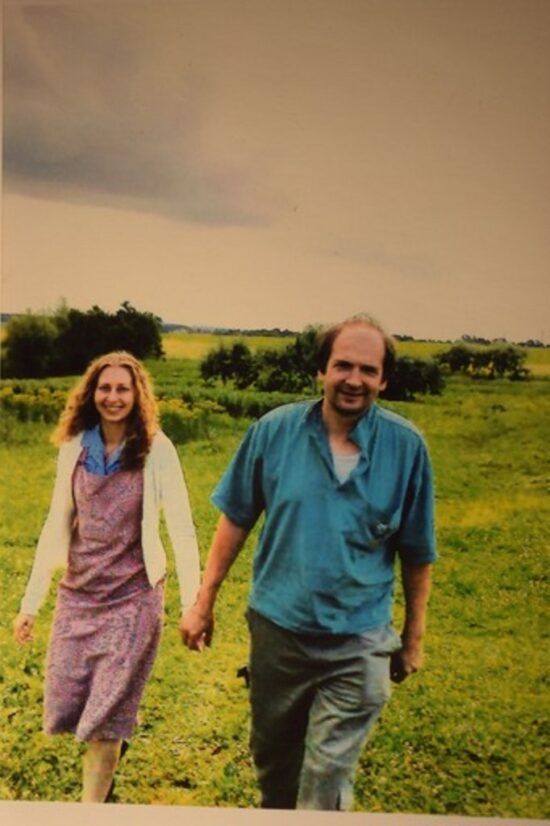
Enjoying free time with wife Kristina